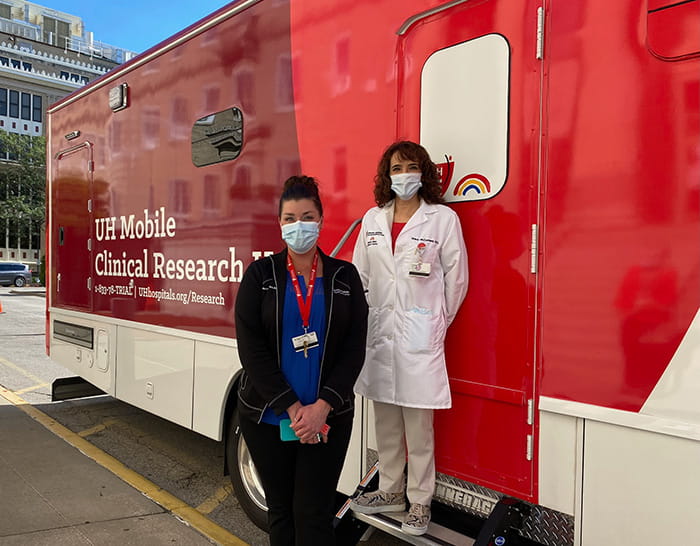Join the Clinical Research Ambassadors Program at University Hospitals
March 20, 2023
Answer a short six-question survey, linked below, to share your current knowledge and interests about UH clinical research
UH Clinical Update | March 2023
Clinical research at University Hospitals is a powerful engine driving discovery and better outcomes for our patients. Take the large, NIH-funded RECOVER study for “Long COVID.” UH was one of just 15 hubs chosen for the study, chosen out of more than 300 that applied. We enrolled the first patient and have been #1 or #2 for patient enrollment throughout – even attracting interest from patients far out of state.
“We have people coming from New Jersey, West Virginia, Michigan and Florida,” says Grace McComsey, MD, FIDSA, Vice President of Research & Associate Chief Scientific Officer at UH and Principal Investigator on the UH RECOVER cohort, as well as Rainbow Babies & Children's Foundation John Kennell Chair of Excellence in Pediatrics. “They fly here at their own expenses just because they believe in this study.”
Closer to home, the UH Clinical Research Center’s Mobile Clinical Research Unit has played a key role in RECOVER enrollment.

“Our mobile research unit is one of a kind,” Dr. McComsey says. “We're able to go throughout the system to meet study participants where they are, in Elyria, Geauga, Parma and lots of other places in the system.”
As a result of these efforts, Dr. McComsey and her team have enrolled more than 1,000 RECOVER participants in just a year. However, she’s quick to share the credit across the system.
“UH caregivers who believe in our mission are the best way to continue to do an amazing job in research,” she says. “They volunteer, they send us their family members and their patients. It was amazing how receptive they were to help us try to define this new condition that already devastated a lot of lives.”
Leveraging “Systemness” for Greater Discovery
Now, Dr. McComsey and her team want to leverage this kind of “systemness” to create even more successes in clinical research at UH. They’re launching the Clinical Research Ambassadors Program to empower non-research caregivers across the system to promote and advocate for clinical research participation in their daily interactions with patients. Everyone is welcome to participate, from administrators, to EVS, to non-research clinical staff, to reception and scheduling.
“You don’t have to be a researcher to support research,” Dr. McComsey says. “In fact, some of our greatest advocates are non-research caregivers. Non-research caregivers have a tremendous influence on providing more options in care for our patients, and improving healthcare as we know it. Our goal with this program is to build awareness of clinical research and its overall impact, and maximize the reach of research studies and clinical trial opportunities by empowering UH caregivers with knowledge and resources to share with patients, family, friends and colleagues.”
How to Join
The first step is to complete the survey below. It’s designed to simultaneously educate our caregivers and obtain insights on their current knowledge about clinical research and preferred mediums for learning more. Pilot-group Research Ambassadors will be provided education and resources to support research in their current roles, such as patient talking points, actionable activities, print collateral, UH web resources and Clinical Research Center t-shirts.
SURVEY LINK: UH Community - Clinical Research Knowledge and Interests Survey (https://redcap.link/Clinical_Research_Knowledge_and_Interests)
According to Dr. McComsey, with the kind of engagement already demonstrated with the RECOVER study, the sky’s the limit for clinical research at UH.
“If we can make each of you research ambassadors, we will be the next Harvard of research,” she says.


